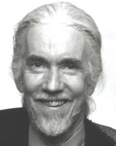
We've all had neighbors who, through years of practice, have learned to spout without pause, and they love yammering at us, never letting us get a word in edgewise. In speech we may be these bores' defenseless victims, but in writing we have a stout defender in the sentence, which, by its nature, demands that from time to time the word flow will come to a full stop. Thank God for sentences!
The sentence is "a group of words expressing a complete thought or feeling," according to Foerster and Steadman's fine 1931 book, Writing and Thinking. What makes up a complete thought or feeling is, of course, something of a mystery, but we all know the sentence as the root structure of grammar: from sentences grow paragraphs, from paragraphs grow chapters, and from chapters grow books. Anyone who enjoys reading and writing develops a feel for the shape and rhythm of sentences, the ebb and flow of their parts and pauses as they wend their way toward their end which, if the sentence be well-written, can be heard coming long before it arrives.
Periods end most sentences:
I guess that's all there is to it.
—but many end with an exclamation mark's snare drum snap:
I'll be damned!
—or with a question mark's rising quaver of doubt:
What am I going to do?
Because ending is essential to sentences, sentences that end chapters and books have added whammy. Dreiser ends the last sentence of Jennie Gerhardt with a dash and a question mark to keep Jennie alive long after the final page:
Before her was the stretching of lonely years down which she was steadily gazing. Now what? She was not so old yet. There were those two orphan children to raise. They would marry and leave after a while, and then what? Days and days in endless reiteration, and then—?
"Yes," "No," and "Maybe" can be full sentences, but most sentences combine a noun and a verb in dynamic unity:
THING DOES
—or:
THING IS
In some sentences a thing does something by itself—"The clock ticks"; at others what the thing does affects another thing—"The fire burns the wood."
Sentences can describe things and actions with great exactitude. In Huckleberry Finn Mark Twain uses a 236-word sentence, the longest I know, to describe a one-horse cotton plantation — here's an excerpt:
A rail fence round a two-acre yard; a stile made out of logs sawed off and upended in steps, like barrels of a different length, to climb over the fence with, and for the women to stand on when they are going to jump on to a horse; some sickly grass patches in the big yard, but mostly it was bare and smooth, like an old hat with the nap rubbed off;...bench by the kitchen door with bucket of water and a gourd; hound asleep there in the sun; more hounds asleep round about;...outside of the fence a garden and a watermelon patch; then the cotton fields begin, and after the fields the woods.
By packing nouns into and leaving verbs out of his sentence, Twain keeps his prose still as the hot Southern afternoon. In contrast, Dickens' many verbs ( and active nouns and adjectives) animate a blustery English night in these sentences from Martin Chuzzlewit:
An evening wind uprose too, and the slighter branches cracked and rattled as they moved, in skeleton dances, to its moaning music. The withering leaves no longer quiet, hurried to and fro in search of shelter from its chill pursuit; the laborer unyoked his horses, and with head bent down, trudged briskly home beside them; and from the cottage windows lights began to lance and wink upon the darkening fields.
Some stops in the word flow come to us from nature: even yammerers must breathe sometime! The question is: how often and when to stop? We can easily say a dozen or more words on a single breath, so if we keep stopping after three, four, or five words, our prose becomes choppy. Yet if we connect endless word coils with commas and semicolons as Twain does, we'll come panting to each period, glad for the breather.
Good prose mixes long and short sentences into an agreeable blend, short sentences standing beside long sentences as a matter of course. Here Henry Fielding in Tom Jones:
Hushed be every ruder breath. May the heathen ruler of the winds confine in iron chains the boisterous limbs of noisy Boreas, and the sharp-pointed nose of bitter biting Eurus. Do thou, oh sweet Zephyrus, rising from thy fragrant bed, mount the western sky, and lead on those delicious gales, the charms of which call forth the lovely Flora from her chamber, perfumed with pearly dews, when on the first of June, her birthday, the blooming maid, in loose attire, gently trips it over the verdant mead, where every flower rises to do her homage, 'till the whole field becomes enamelled, and colors contend with sweets which shall ravish her most.
Fielding opens with a quick five-worder, goes on to a long twenty-five worder, then on to an eighty-one word monster, creating an effect of accumulating grandiosity: short-Longer-LONGEST! At first Dashiell Hammett's sentences in The Glass Key look different from Fielding's:
The room had two windows. He went to the nearer window and tried to raise it. It was locked. He unfastened the lock and raised the window. Outside was night. He put a leg over the sill, then the other, turned so that he was lying belly-down across the sill, lowered himself until he was hanging by his hands, felt with his feet for some support, found none, and let himself drop.
—but Hammett too moves from short sentences to long, here by staggered steps: short-longer-short-Longer-short-LONGEST, creating a similar cumulative climax.
A long sentence after a short sentence smooths out a staccato burst:
The baby was coming. Each morning she was nauseated, chilly, bedraggled, and certain she would never be attractive again; each twilight she was afraid.
—Sinclair Lewis, Main Street
A short sentence after a long sentence chops off a legato curve:
Both parties deprecated war; but one of them would make war rather than let the nation survive; and the other would accept war rather than let it perish. And the war came.
—Abraham Lincoln, Second Inaugural Address
Modern writers favor an informal blend of short and long sentences. In his masterpiece, Whistle, James Jones mixes fluid medium-lengthers:
They passed a large green park with a golf course in it, where men in shirtsleeves moved on the fairways followed by Negro caddies.
—with flurries of shorties:
We were somehow unclean. We were tainted. And we ourselves accepted this. We felt it too.
—and the occasional cowabunga:
Somewhere down in the deepest part of his mind, in some place he wished neither to investigate or explore, but consciously knew was there, was a strong feeling, a superstition, that if he could bring Strange and Prell and Landers through, without them dying or going crazy, and make them come out the other side intact, he might himself come through.
—yet we barely notice the variety because each sentence is so naturally paced, its length so well suited to its thought.
Last word on sentences (for the moment!): don't make 'em all short, don't make 'em all long, and don't let any of 'em them wander on and on through the fertile meadows of your intoxicated imagination until you sound like that annoying neighbor who has always got to tell you just one more thing about her poor second cousin in Schenectady until you're ready to scream, "Shut up already!"


